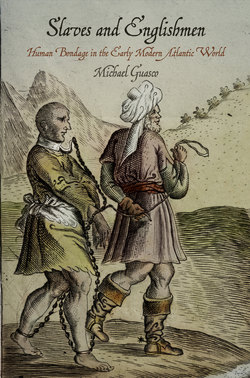Slaves and Englishmen

Реклама. ООО «ЛитРес», ИНН: 7719571260.
Оглавление
Michael Guasco. Slaves and Englishmen
Отрывок из книги
Slaves and Englishmen
Peter C. Mancall, Series Editor
.....
The religious and intellectual legacy of slavery and decaying domestic institutions like manorial villeinage were not the only ways that Englishmen may have experienced bondage, or imagined slavery, in a domestic setting. Englishmen were also able to witness and experience slavery as a penal institution during the sixteenth century. Penal slavery, however, differed from villeinage in a number of crucial ways. Unlike villeins, penal slaves were not born into bondage, rather they were reduced to slavery as a form of punishment resulting from their own actions. Penal slavery was clearly punitive, but it is even more interesting because it was also envisaged, in some circles, as a progressive form of individual improvement and social control. The idea of slavery as a positive, virtue-instilling institution was most clearly revealed in Thomas More’s Utopia, which first appeared in a number of Latin editions after 1516. Subsequently, two English translations by Ralph Robinson were published in England in 1551 and 1556. Although More’s text was not explicitly concerned with the subject of human bondage, he addressed the subject thoroughly. In particular, as a result of his critique of the arbitrary and harsh punishments suffered by common thieves (which included the death penalty) More suggested alternative ways of dealing with criminal behavior. In this vein, in Book One, More lauded the more humane and practical punishment of common criminals in Persia among a group of people styled the “Polylerites.”58 Instead of death, thieves in this fictional land were condemned to be “common servauntes to the common wealth.” Lest there be any confusion about the degraded status of these “serving men,” as they are termed in Robinson’s English translation, these criminals were clearly marked. They were to be “apparailed in one coloure,” their hair was “rounded a lytlte above the eares. And the typpe of one eare is cut off.” Moreover, Polylerites rigidly constrained bondmen whom they “locked in theyr chambers” at night, whipped for indolence, declared that they “may touch no weapons,” and threatened with death if they “intende[d] to runne awaye,” much less “do it in dede.” Nonetheless, bondmen were otherwise treated gently, for their “punyshement intendeth nothynge elles, but the destruction of vices, and savynge of menne: wyth so usynge, and ordering them, that they can not chuse but be good.” Thus, “everye yeare divers of them be restored to their freedome: throughe the commendation of their patience.”59
The reasonable—or “worthy and commendable” as Robinson’s marginal note indicates—system of slavery More located in Persia agreed with the one More’s fictional traveler, Raphael Hythloday, encountered in Utopia.60 More treated the subject of human bondage quite carefully in Book Two, choosing even to give the subject of slavery its own section heading.61 Utopians acquired slaves through well-defined channels. First, they did not “make bondemen of prisoners taken in battayle” unless it was a “battaylle that they foughte themselves.” Second, Utopians purchased convicted criminals, or those in “other landes [who] for greate trespasses be condemned to death.” A third group of slaves consisted of “their owne men,” whom “they handle hardest” because “they being so godlye brought up to vertue in soo excelente a common wealth, could not for all that be refreined from misdoing.” Finally, Utopians sometimes allowed a “vile drudge” from another country to “chuse of his owne free wyll to be a bondman among them.” Utopian slaves, then, were men who suffered such a fate as a result of just wars, because of criminal behavior, or by choice. As More makes clear, Utopians were discriminating when it came to their slaves; neither another nation’s prisoners of war nor the “bondmens children” could therefore be counted among the enslaved.62
.....